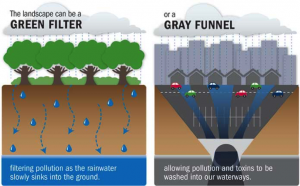The draft combined sewer overflow (CSO) Long Term Control Plans (LTCPs) are due on October 1. The second CSO LTCP review workshop, hosted by NewarkDIG, Sewage Free Streets and Rivers, and Jersey Water Works, armed attendees with the tools needed to navigate the LTCPs and prepare comments to submit to the New Jersey Department of Environmental Protection. According to New Jersey Future, 17% of the state’s population live in a CSO community, and population growth in CSO cities has only grown in the last decade.

During the first half of the workshop, speakers discussed how to provide the greatest amount of benefits for CSO communities, primarily through the implementation of green infrastructure (GI) and similar strategies. Scott Schreiber, executive director of Camden County Municipal Utilities Authority (CCMUA), explained the goals of CCMUA’s LTCP, including a 10% reduction in directly connected impervious areas, which means removing 145 acres city-wide (30 acres per 5-year permit cycle). Partnerships with non-profit organizations and community groups through Camden SMART (Stormwater Management and Resource Training) and the Camden Collaborative Initiative helped shape the CCMUA’s plan and steered the authority to address stormwater management as well as other environmental problems such as street flooding and the heat island effect. Schreiber said that implementing green infrastructure will provide immediate opportunities compared to gray infrastructure, lead to local employment opportunities, engage community members and businesses/organizations, and ease coordination with ongoing infrastructure projects. In the future, the CCMUA is looking to scale up its GI projects, continue working with the community, and create a holistic maintenance plan.
Rosana DaSilva, water quality manager for the New York–New Jersey Harbor & Estuary Program, expanded on the benefits of including GI projects in LTCPs. A flyer created by Earth Economics with input from the Sewage-Free Streets and Rivers Campaign highlights how GI can be a part of the solution. GI is a cost-effective solution for CSOs from an operations and maintenance perspective, and tends to store more gallons of water per dollar invested. Additionally, GI supports emissions reductions and utility energy bill savings, supports adaptation/resilience, and spurs local economic development.
Andy Kricun, Jersey Water Works CSO Committee co-chair, discussed six strategies and tips for community benefit considerations for LTCP submissions:
- Authorities should make sure that ongoing operations and maintenance of CSO systems are done equitably. These CSO systems, no matter how well they are designed, are only effective if they are kept clean and available for full capacity usage.
- Underserved communities should not be excluded from the planning process; equity is critical.
- Underserved communities should not be taken care of last; these plans take a considerable amount of time, and certain neighborhoods should be prioritized.
- LTCPs should not only implement projects that project underserved or environmental justice communities from combined sewage flooding, they should also look for opportunities to not only be protective but beneficial as well.
- CSO communities should utilize funding from the NJ Infrastructure Bank to the maximum extent possible to realize the lowest possible annual debt service for implementation of the LTCPs.
- CSO communities should also implement stormwater fees for owners of larger impervious surfaces. If a stormwater fee is not charged, residential ratepayers will be forced to cover the cost of pumping and treating the sewage generated.
In the second half of the workshop, speakers talked about reviewing LTCPs before the October 1 deadline. Kimberley Irby, policy analyst at New Jersey Future, presented a LTCP review worksheet that serves as a guide for community members to review the plans and provides questions and a framework for reviewing them. Comments and concerns on the LTCP can be submitted to Susan Rosenwinkle from the NJDEP Division of Water Quality (Susan.Rosenwinkle@dep.nj.gov) and the appropriate CSO permit holder.
Community members should encourage their CSO permit holders to share the draft CSO LTCPs with the public for comment and hold a public meeting before they submit their plans to the NJDEP. The period for public comment will extend beyond October 1; there will be another opportunity to comment on the plans once they are submitted and posted on the NJDEP website in mid-October. Make sure your community is informed and has a voice in these plans. Furthermore, look out for future Sewage-Free Streets and Rivers campaign workshops and resources that will assist CSO communities with reviewing these plans and submitting comments.

